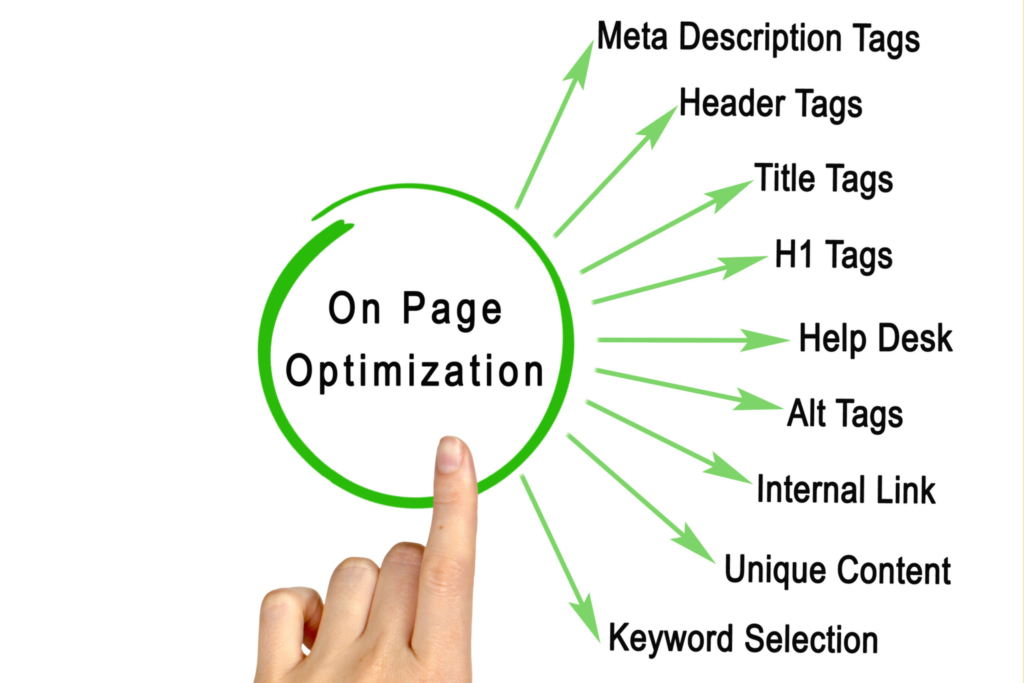How to Optimize Houston Website Design for Local SEO

Optimizing your Houston website design for local SEO is a must if you want to attract more traffic to your physical storefront. Local SEO focuses on optimizing your digital assets for maximum visibility in search results.
Having a strong digital presence is vital for businesses of all sizes. Gone are the days when prospective customers let their fingers do the walking in the Yellow Pages of the local phone book in search of businesses near them. Now, they open the internet browser of their choice, pop in a few keywords, and voila – search engines return a handy list of local places to patronize.
Local SEO is about more than using relevant keywords in your digital content. You must optimize your web pages using specific techniques to boost your authority and visibility with search engines like Bing and Google.
Not sure how it all works? You’ve come to the right place! In this blog, we explore how to optimize your Houston website design for local SEO by answering common questions such as:
- What is local SEO?
- How do you conduct local keyword research for Houston?
- How do you optimize on-page elements for local SEO?
- How do you create location-specific landing pages?
- How do you leverage Google My Business for local SEO?
- How do you monitor and measure local SEO success?
What is local SEO?
Local SEO is a crucial component of targeted marketing strategy. Working with a website designer skilled in local SEO techniques allows you to attract highly qualified leads actively searching for the products or services you offer in your area.
Not only can employing local SEO tactics boost your chances of converting leads into sales, but it also helps you build a strong local customer base that encourages loyalty and repeat business.

Key elements of Houston website design local SEO
For local SEO to work, you must incorporate some of the key elements of this digital marketing strategy. Combining the following techniques increases your visibility in local search results, attracts your ideal customer, and drives more customers to your brick-and-mortar location.
- Local SEO Keywords. Identify and incorporate relevant SEO keywords into your website content. These keywords must include location modifiers such as city names, zip codes, and geo-specific terms like “near me.”
- On-Page Optimization. Optimizing your website’s on-page elements is essential for local SEO. You must include relevant local SEO keywords in your title tags, meta descriptions, header tags, and URL structures.
- Local Citations and Backlinks. Building local citations – mentions of your business name, address, and phone number – on reputable online directories, industry-specific websites, and local publications boosts your local SEO.
- Social Media Engagement. Engaging with your audience on social media positively impacts your local SEO efforts. Sharing localized content, responding to comments and messages promptly, and encouraging user-generated content build a strong online presence and increase local visibility.
How do you conduct local keyword research for Houston?
Conducting local SEO keyword research involves identifying and selecting relevant keywords that have local intent and are specific to your target location.
Follow this step-by-step guide on how to conduct local SEO keyword research. If you’re working with a website designer who understands local SEO, they can do these steps for you.
- Understand your target audience
Start by researching your ideal customer and their online search behavior. Consider factors such as their proximity to your business, demographics, interests, and the specific products or services they search for online. Understanding your target audience is the critical first step in generating relevant keywords. - Act like a consumer
Put yourself in the shoes of your ideal customer. Open the browser of your choice and plug in whatever keywords you think will help you find businesses that provide those services. Google provides a “People Also Ask” section that shows you what keywords and keyword phrases others looking for similar services used. You can then incorporate those search phrases into your local SEO keyword strategy. - Use keyword research tools
Keyword research tools such as Google Keyword Planner, Moz Keyword Explorer, SEMrush, and Ahrefs help you narrow down your local SEO keywords. Just plug in your general location and a list of possible keywords, and these tools refine them for you.

How do you optimize on-page elements for local SEO?
Optimizing on-page elements for your Houston website design boosts local SEO. Some of the methods include using local keywords, ensuring NAP consistency, and optimizing various on-page elements.
- Title tags, meta descriptions, and header tags. Craft unique and descriptive title tags for each web page. Include relevant local SEO keywords when appropriate. Place any location-specific keywords near the beginning of the title tag to emphasize local relevance. Header tags include H1, H2, and H3 headers that separate content into small chunks to improve the user experience. Use relevant local SEO keywords in the headers. Meta descriptions accurately summarize a web page’s content. Use local SEO keywords in the descriptions to boost your local search visibility.
- Optimizing content with local keywords. All content on your website – blogs, case studies, product and service pages – should include relevant local SEO keywords. Be careful not to engage in keyword stuffing. Search engines penalize websites that use this tactic because it makes content sound unnatural. Include as much location-specific content as possible, including testimonials from customers.
- Emphasis on NAP (name, address, phone number) consistency. Make sure your business name, address, and phone number appear consistently across the website. Check headers and footers and schema markups to ensure NAP details are the same no matter where they appear.
How do you create location-specific landing pages?
Website developers skilled in Houston website design using local SEO techniques understand and encourage the addition of location-specific landing pages. When implemented correctly, these pages target specific geographic areas and optimize your website for local SEO.
Some of the steps used to create effective location-specific landing pages include:
- Identify target locations. Determine the specific locations or regions you want to target with your landing pages. Then, use the names of cities, neighborhoods, and regions in your headers and body content to expand your local presence.
- Develop unique content. Create content for location-specific landing pages that are unique. Never duplicate the same content from another page on your website by swapping out only the location name. Doing so negatively impacts your SEO because web crawlers will think it’s duplicate content and not index each page.
- Create a location-specific call-to-action (CTA). Each local landing page should include a location-specific CTA. Ideally, a CTA that encourages website visitors to come by your physical location works best for increasing foot traffic and sales.
- Implement schema markup. Using this local SEO tactic provides search engines with structured data about your business’s location-specific details.

How do you leverage Google My Business for local SEO?
If you don’t have a Google My Business account, you’re missing out on an effective local SEO marketing technique. Google allows businesses to claim and verify their business listing at google.com/business. Google may already have created a page for your business based on information its web crawlers found elsewhere online. If so, you simply claim it and follow the steps to verify your ownership.
To get the most out of your GMB listing, you’ll want to:
- Choose relevant categories that accurately represent your business. Unfortunately, the list isn’t extensive, and you may have to select a category that’s not 100% reflective of what you do. Make the best choice and then you can reflect your products and services in the other parts of your listing.
- Optimize your business listing. Use the same local SEO keywords from your website on your GMB content.
- Upload high-quality images. GMB provides the opportunity to upload images and videos. Make sure you use only high-resolution versions to improve the user experience.
- Request customer reviews. GMB includes a feature that allows you to request reviews from your customers. Each review shows up on your profile, helping build your local reputation. Make sure you respond to online reviews – especially bad reviews. Doing so shows your commitment to customer service.
Working with a content manager who understands how to leverage the power of GMB can unlock other benefits to having this as part of your local SEO marketing strategy.
How do you monitor and measure local SEO success?
Monitoring local SEO success involves tracking and analyzing key metrics to assess the effectiveness of your efforts. Google provides an excellent free tool called GA4.
The latest iteration of Google Analytics, GA4 includes new tools and features to help you pinpoint website design and content issues that hinder your ability to appear in search results.
GA4 isn’t the only tool you can use. Others provide more in-depth analysis to help you refine local SEO keywords and other local SEO techniques. However, not all of them are free.
Some of these tools include:
- SEMrush Listing Management monitors listings, reviews, and local SEO pages. It offers a host of features, including automatic updating of online listings to ensure accuracy.
- Moz Local is one of the most popular local SEO tools available. It works best for small and enterprise businesses to ensure online listings are correct to help boost website visibility. It integrates with Google and Facebook, uses an automated duplication deletion function, and handles social posting.
Get Houston website design for local SEO
Ready to explore local SEO for your business but aren’t sure how to get started? Reach out to BK Design Solutions today to schedule a complimentary consultation with a member of our team. We’ll discuss your options and the next steps to boost your local visibility and grow your customer base.
Houston Website Design, web design agencies, website designer Houston, website developer